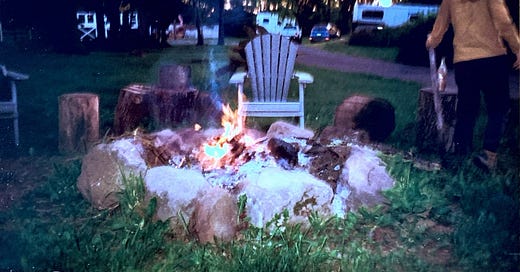Hi All, Just a quick note that hitting the like/heart button is a good, free & easy way to support these newsletters! Of course I appreciate you being here, either way.
If you’re looking for ways to support Palestinian people in a direct and material way, consider making a contribution to Dr. Samar Shamlakh, a pharmacist seeking funds to leave Gaza. In her words, “I appeal to you not as a supplicant, but as a human being striving for a dignified life. Your support, no matter how modest, represents a tangible step towards a future of peace and security.”
Earlier this year, my friend Dom Matti shared a clip of Toni Morrison being interviewed by Mavis Nicholson about self-forgiveness. Morrison said, “you have to experience the full fall, the complete self-loathing, in order to come around…if you feel the real thing which is shame, hatred, humiliation, and self-loathing, that is the door.”
Around the same time I saw that clip, I was reading and writing about Stephen Mitchell’s telling of Joseph and the dream coat, which is a story about a gifted but arrogant brother who’s betrayed by his siblings and left for dead at the bottom of a cistern. And there, bruised and bloody, he prays.
Joseph does not pray to survive the ordeal, or to get revenge on his brothers, but for humility. There are situations in life when it feels like there’s no one else to confront but oneself. And I was interested in that story because I was in the throes of something that felt very similar. Morrison’s words came at just the right time.
Later on in the interview, Nicholson asks Morrison if everybody needs self-confrontation. Morrison replies “absolutely,” and notes that the characters in her books are all eventually forced into places where their “definitions of themselves are suspicious.” For Morrison, when the usual ways of knowing yourself are sufficiently challenged, you get “stripped down and made very lean so that you can see who you are.” And then, she says, “you make peace.”
At first I imagined that being “made very lean” meant making contact with a singular truth about who one purely or essentially is. I am worthy! I am enough! I am lovable! And that may be the case for some people.
But for me, that is not how it’s happened. In my case, being made lean was a process of reckoning with complex conditions. Conditions that were way more chaotic and contradictory than the monotonous myths I tended to tell about who I was in a given moment; all good or bad, innocent or guilty, worthy or unworthy.
I’m thinking in terms of complex conditions because I’m well into Catherine Keller’s Face of the Deep: A Theology of Becoming. My experience with reading this book has been itself a process involving varying degrees of my own willingness to confront complex conditions. Which is to say that it’s not been an easy read, but it’s also been exciting and worthwhile.




